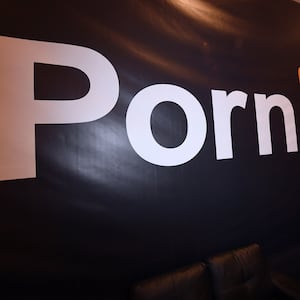Netflix tries to steal back some eyeballs from one of its biggest online video-streaming competitors with Money Shot: The Pornhub Story, a documentary about the creation and travails of the internet’s pre-eminent X-rated emporium. Viewers hoping for salaciousness or titillation, however, will be sorely disappointed by Suzanne Hillinger’s feature (March 15), which eschews nudity (much less hardcore material) to an almost disingenuous degree in favor of a skin-deep and saggy look at the 21st-century porn wars.
Money Shot: The Pornhub Story’s title comes from the term for an adult film’s climax, but it also more subtly refers to the revenue side of the business. Whereas porn content was traditionally available via theatrical films, VHS tapes and magazines, the rise of the web begat a host of sites that—using YouTube as a model—allowed users to upload whatever they wanted. Of those pioneers, Pornhub quickly became the biggest and most successful, attracting 3.5 billion visitors a month and, in the process, ranking as the 10th most visited site in the world. Unsurprisingly, the national media spotlight followed, making its name synonymous with digital erotica.
Pornhub is owned by MindGeek, a private Luxembourg-based company whose center of operations is in Canada. According to former employee Noelle Perdue, it was a “hilariously boring office space,” full of gray carpets and cubicles, and run by executives—CEO Feras Antoon, COO David Tassillo and co-founder Bernd Bergmair—who cared more about spearheading a thriving tech giant than a porn empire. The key to their success was a data-harvesting system that allowed them to tailor content to consumers in a way that far outpaced their non-porn rivals (because they simply had more material with which to work), as well as a paradigm-disrupting focus on unauthorized distribution. Anyone could post clips to Pornhub, and while those uploaders didn’t earn anything for their efforts—verification was mandatory in order to profit—Pornhub itself benefited greatly from this tidal wave of free, unsanctioned videos, courtesy of increased traffic that led to enormous ad revenue.
ADVERTISEMENT

By 2011, adult film stars and producers realized that, with their films now rampantly stolen and shared on Pornhub, they had no choice but to partner with the site—a shift that eventually resulted in an authorized channel called Modelhub that allowed actors and actresses to earn a living from their work. Money Shot: The Pornhub Story casts Modelhub and the similar OnlyFans as empowering venues for sex-worker independence, as is the case with Gwen Adora, a self-employed camgirl who discusses her one-woman show and the freedom it gives her in comparison to working for a larger outfit. Considering that, as performer Wolf Hudson claims, you can make over $10,000/month on Modelhub (more than twice what a studio might pay for like-minded services), it was no surprise that vets and newbies alike flocked to these new platforms.
Trouble, however, was brewing, and it finally peaked when activist Laila Mickelwait launched #Traffickinghub, an online campaign intended to shed light on the fact that Pornhub was home to countless videos of minors. Mickelwait made so much noise that she attracted the attention of The New York Times columnist Nicholas Kristof, who was horrified by what he found (and was shown) on Pornhub. In response, he penned a headline-making story (The Children of Pornhub) about one of its many victims: Serena K. Fleites, an eighth-grader whose private nude videos (shot when she was 14) became a persistent mainstay on the site, meaning Pornhub made money off them through ads. Kristof suggested a trio of solutions to this problem: only let verified users upload; prohibit downloads; and expand moderation. Once Mastercard and Visa severed ties with them, Pornhub relented on all three.
For performers like Siri Dahl, the credit card companies’ decision was a devastating blow, and she and others (including Cherie DeVille) make clear that this was all due to an erroneous conflation of legitimate pornography and illegal videos of criminal misconduct and abuse. Money Shot: The Pornhub Story wades into these contentious waters, trying to separate the lawful from the illicit, and whether Mickelwait and her organization Exodus Cry—as well as The National Center on Sexual Exploitation (NCOSE), formerly known as Morality in Media—are crusaders concerned about sex trafficking, or evangelical Christian moralists intent on eradicating the industry altogether. Meanwhile, it also details a civil lawsuit filed on behalf of 30 women by lawyer Michael Bowe that dubs Pornhub a “Sopranos-style” “criminal enterprise,” and which he says is committed to incentivizing the industry to clean up its act.

Director Hillinger raises these topics from what feels like a distance; though she chats with a handful of relevant players on both sides of the Pornhub divide, there’s little depth to her inquiry. Porn performers defend themselves and express a desire for autonomy (which they believe is now threatened), critics slam Pornhub and its culture of underage sexual exploitation, and the film more or less leaves it at that. Not taking an unduly biased stance might be theoretically admirable for a documentary intent on navigating thorny terrain. Yet Money Shot: The Pornhub Story is all surface chit-chat about serious issues, to the point that it’s hard to develop a strong opinion about this matter other than that genuine porn and illegal material are two different things, and that it would be best for all involved if platforms weeded out the latter entirely, regardless of the cost to their bottom line—which is hardly a groundbreaking takeaway.
Further complicating one’s reaction to Money Shot: The Pornhub Story is a pervasive sense of dishonesty. NCOSE senior counsel Dani Pinter comes across as intently committed to underplaying (if not outright concealing) her organization’s religious underpinnings, thereby calling into question their true motives. The proceedings’ primarily non-explicit depiction of professional porn is similarly misleading, epitomized by footage of Dahl making cutesy penis-review videos and chatting chastely with two co-stars on camera about what turns them on (their answers: “sensual making out” and “kissing”). Refusing to provide an accurate and trustworthy snapshot of what both these opposing factions are really about, the film comes across as a superficial exposé afraid of getting dirty.







